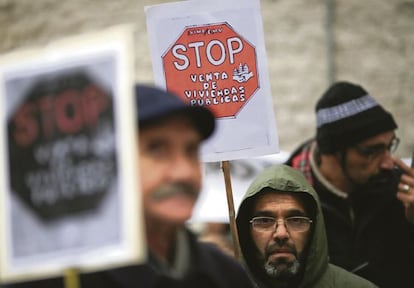60% of Madrid evictions are from public flats sold to investment funds
Treasury Ministry report contains worrying data regarding resources available for rehousing

Six out of every 10 evictions in the Spanish capital are taking place in public housing units that have been sold over recent years by the Madrid regional government and City Hall to investment funds. That’s according to data included in a report from the Treasury Ministry that analyses and harshly criticizes the policies included in the electoral program of new mayor, Manuela Carmena (Ahora Madrid).
Carmena, a former judge who came to power as Madrid mayor on Saturday thanks to votes from the Socialist Party (PSOE), has promised to stop the spate of evictions that have been seen in crisis-stricken Spain over recent years, and offer public housing to victims in the capital.
Of the 184 evictions included in the report, just 17% of cases saw another property being offered to the victims
According to the data in the ministry report, of the 111 eviction cases registered between February and June of this year, 65 were in houses that had been sold by Madrid administrations.
The controversial report from the ministry – to which EL PAÍS has had access and which was released on the first working day of Carmena’s mandate – slams many of the politician’s policies as being unworkable. However, the data contained within paints a stark picture of the management of public housing by both the regional government and City Hall, both run by the Popular Party for many years.
Between February and June, the report states, there were 50 evictions that took place in properties sold by the Municipal Company for Housing and Land (EMVS) to an investment fund. Another five evictions took place in flats sold by the Madrid Housing Institute (Ivima) to another fund; and 10 more were related to housing from the EMVS and Ivima. In total, 65 of 111.
In terms of evictions carried out by banks, the report registers 17, which works out at 15%, while another 29 evictions were brought about by private landlords. There were also 73 evictions from illegally occupied properties.
The ministry report states that the Madrid districts of Villa de Vallecas, Carabanchel and Latina saw the most evictions, due to the “high concentration of [the sale of] public housing to investment funds” in these areas.
Of the 184 evictions included in the ministry report, just 17% of cases saw another property being offered to the victims. The report adds: “The number of illegal occupations and non-payment from private tenants is worrying, given that these people have scant economic resources, making the use of existing resources very difficult.”
Madrid City Council has just 418 public apartments to cover emergencies; 347 are already assigned
Madrid City Council currently has just 418 public apartments to cover these emergencies; 347 have already been assigned, benefitting 1,060 people, while the rest are under construction.
Ahora Madrid has pledged to impose fines on banks, investment funds and real estate firms to dissuade them from accumulating property portfolios for speculative ends.
The ministry report, however, criticizes that move, saying that it would “bring down the price of rentals” in the city, and lower the cost of acquiring a property. This “would have a negative effect on the families and citizens who own their own homes,” it adds. And, paradoxically, it goes on to say that “a strong fall in prices would lead to the arrival of vulture funds.”
Tu suscripción se está usando en otro dispositivo
¿Quieres añadir otro usuario a tu suscripción?
Si continúas leyendo en este dispositivo, no se podrá leer en el otro.
FlechaTu suscripción se está usando en otro dispositivo y solo puedes acceder a EL PAÍS desde un dispositivo a la vez.
Si quieres compartir tu cuenta, cambia tu suscripción a la modalidad Premium, así podrás añadir otro usuario. Cada uno accederá con su propia cuenta de email, lo que os permitirá personalizar vuestra experiencia en EL PAÍS.
¿Tienes una suscripción de empresa? Accede aquí para contratar más cuentas.
En el caso de no saber quién está usando tu cuenta, te recomendamos cambiar tu contraseña aquí.
Si decides continuar compartiendo tu cuenta, este mensaje se mostrará en tu dispositivo y en el de la otra persona que está usando tu cuenta de forma indefinida, afectando a tu experiencia de lectura. Puedes consultar aquí los términos y condiciones de la suscripción digital.








































